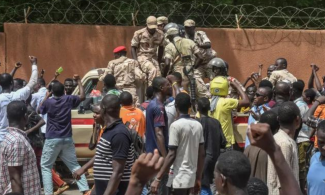
The warning from Niger’s military-ruled neighbours came a day after West African leaders, supported by their Western partners, threatened to use “force” to reinstate the democratically elected Bazoum and slapped financial sanctions on the putschists.
The military junta in Burkina Faso and Mali have warned that any military intervention in Niger Republic to restore deposed President Mohamed Bazoum would be considered a “declaration of war against their two countries."
The warning from Niger’s military-ruled neighbours came a day after West African leaders, supported by their Western partners, threatened to use “force” to reinstate the democratically elected Bazoum and slapped financial sanctions on the putschists.
In a joint statement, the governments of Burkina Faso and Mali warned that “any military intervention against Niger would be tantamount to a declaration of war against Burkina Faso and Mali”.
They said the “disastrous consequences of a military intervention in Niger could destabilise the entire region."
Bamako and Ouagadougou in the first-ever joint communique on Monday, unequivocally said they would consider any such move as an attack on their own countries.
“Any military intervention against Niger would amount to a declaration of war against Burkina Faso and Mali,” said point four of the joint communique, which a Burkinabe military spokesman deliberately repeated three times during a state television broadcast.
In case of such an intervention, the two countries would withdraw from the Economic Community of West African States (ECOWAS) and “adopt self-defense measures in support of the armed forces and the people of Niger,” according to the statement.
A military intervention against Niger “could destabilise the entire region, as had the unilateral NATO intervention in Libya, which was at the root of the expansion of the terrorism in the Sahel and West Africa,” the two governments said.
France currently has 1,500 troops and a drone base in Niger, while the US has 1,100 troops and two drone bases, according to Financial Times.
Nigerien soldiers, led by General Abdourahamane Tchiani, ousted President Mohamed Bazoum last Wednesday.
The African Union denounced the coup on Friday and gave the junta in Niamey 15 days to stand down or face “punitive measures.”
ECOWAS issued its ultimatum on Sunday, at the emergency meeting in Abuja, Nigeria, saying that it would “take all measures necessary to restore constitutional order in the Republic of Niger,” including the use of force if Bazoum is not restored within a week.
Mali and Burkina Faso condemned the sanctions ECOWAS announced on Saturday as “illegal, illegitimate, and inhumane.” They also expressed “fraternal solidarity” with the Nigerien people, “who have decided to take their destiny into their own hands and to assume before history the fullness of their sovereignty,” according to their joint communique.
The military governments of the two former French colonies have sought to sever their ties to Paris and rebuild their statehood with Russian assistance.
Moscow has denounced the coup in Niger as an “anti-constitutional act,” however, and the Russian Foreign Ministry called on all parties to refrain from using force.
On Sunday, General Tchiani’s government announced it would suspend the export of uranium and gold to France, to the accolades of some of the local population.
“We have uranium, diamonds, gold, oil, and we live like slaves? We don’t need the French to keep us safe,” one pro-government demonstrator told the local news portal Wazobia Reporters.
Niger is the world’s seventh-largest producer of uranium, accounting for 4% of the global output.